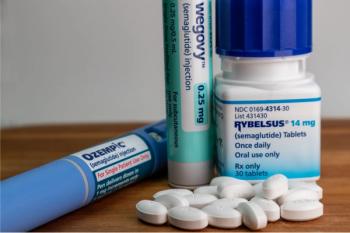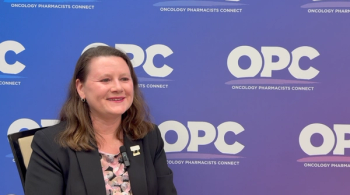
Ready-to-use glucagon simplifies hypoglycemia rescue by providing easy-to-use options for patients and caregivers.

Ready-to-use glucagon simplifies hypoglycemia rescue by providing easy-to-use options for patients and caregivers.

These changes are creating operational challenges for oncology infusion centers.

Manish Agrawal, MD, discusses the expanding influence of his group-based psychedelic therapy model in oncology and beyond, highlighting its adaptation in military posttraumatic stress disorder (PTSD) research, the sustained benefits of long-term patient integration, and growing institutional interest in psychedelic-assisted therapy.

Pharmacists have the skills to improve patient outcomes and relieve burdens on other providers.

Lorundrostat reduces blood pressure and urine albumin-to-creatinine ratio in patients with chronic kidney disease (CKD) and hypertension.

Continuous glucose monitors provide individuals with type 2 diabetes with real-time, actionable insights about their health.

Oral semaglutide shows promising cardiovascular benefits for type 2 diabetes patients, reducing major adverse events by 14% in the SOUL trial.

CagriSema shows promising weight loss and metabolic benefits in recent trials, offering new hope for obesity and type 2 diabetes management.

Experts discuss the low prescription rates of ready-to-use glucagon for individuals with diabetes.

Expert shares insights on advancing diabetes care in community pharmacies.

Semaglutide shows promise in enhancing walking ability and reducing disease progression in patients with type 2 diabetes and peripheral artery disease.

The expert discusses the evolving landscape of diabetes treatment, emphasizing the importance of comprehensive care beyond glucose management.

Oncology pharmacists are increasingly shaping patient care by integrating remote care, medication reconciliation, and artificial intelligence (AI), as well as by addressing drug shortages.

At the 2025 Oncology Pharmacists Connect (OPC) meeting, Kevin Chen, PharmD, MS, BCOP, CPP, reviewed several key studies from the 2025 American Society of Clinical Oncology (ASCO) Annual Meeting, highlighting significant advancements in the treatment of small cell and non–small cell lung cancer.

Heidi Finnes, PharmD, BCOP, FHOPA, discusses the evolving landscape of treatment of cutaneous malignancies.

The expansion of pneumococcal vaccine recommendations would ultimately lead to economic and health benefits, especially for underserved populations.

The FDA approves dupilumab as the first targeted treatment for bullous pemphigoid, offering hope for patients with this debilitating skin condition.

Jolynn Sessions, PharmD, BCOP, FHOPA, shares her experience as a clinical pharmacist and the value of the Oncology Pharmacists Connect meeting.

Amy Duong, PharmD, BCACP, highlights the importance of patient counseling and addressing logistical challenges in treating patients with chronic inflammatory demyelinating neuropathy (CIDP).

Gowri Reddy Rocco, MD, MS, discusses how low vitamin D3 levels, insulin resistance, and metabolic health are critical yet often overlooked factors in understanding and treating long COVID.

Staying current across every disease state, drug, and toxicity is burning people out.

Expert shares key upcoming sessions at the American Diabetes Association 85th Scientific Sessions.

Discover essential tips for sunburn prevention and treatment, insect bite protection, and effective remedies for outdoor fun with family.

When no contraindications are present, most cases can be managed well with nonsteroidal anti-inflammatory drugs.

At the 2025 Oncology Pharmacists Connect (OPC) meeting, Courtney Cavalieri, PharmD, BCOP, presented clinical trial findings in gastrointestinal (GI) cancers—including colon, gastric, pancreatic, and metastatic colorectal cancer—that highlight the expanding role of immunotherapy and targeted treatments.

At the 2025 Oncology Pharmacists Connect (OPC) meeting, Mya Tran, PharmD, BCOP, highlights the clinical promise, operational challenges, and evolving role of pharmacists in implementing precision medicine and genomics-driven cancer care.

Victoria Nacher, PharmD, BCOP, offers key insights about the evolving treatment landscape for hematologic malignancies.


Its approval was based on data from a 3-year trial that enrolled patients with alkaptonuria.

Janet Espirito, PharmD, discusses real-world outcomes from a large community oncology study showing that patients with BRAF-mutated melanoma—including those with brain metastases—experienced similar benefit from frontline immune checkpoint inhibitor (ICI) therapy.